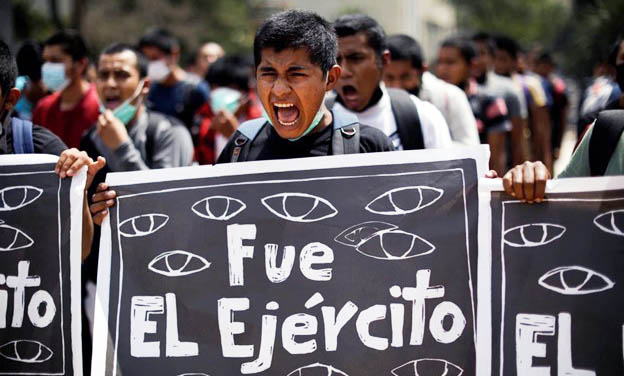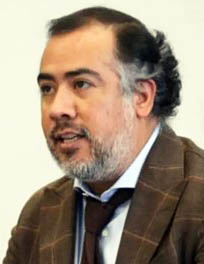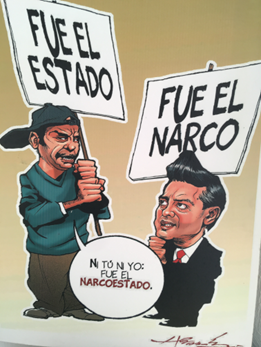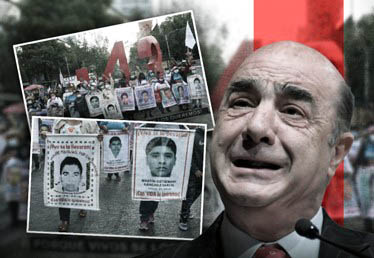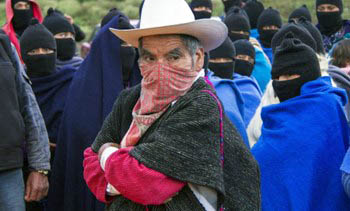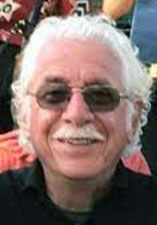|
|
|
|
The weekly newsletter of the México Solidarity Project |
|
|
|
Online at mexicosolidarityproject.org |
|
March 1, 2023/ This week's issue/ Meizhu Lui, for the editorial team |
|
|
“It was the Army”: Photo: Luis Cortés/Reuters |
|
Impunity: When the Wheels of Justice Won’t Turn |
|
In the United States, just a month ago, images of yet another black man getting beaten to death by police — this time in Memphis, Tennessee — battered our senses. Police forces have been conducting murders like this one, with impunity, for generations — and not just in the United States.
Last week, at a Peace Summit in México City organized by Global Exchange, a spokeswoman for Mexican families whose loved ones have gone “disappeared” made clear that military and political figures in México have been doing their dirty work with impunity for decades.
“We are not victims of organized crime,” she declared. “We are victims of institutionalized violence by the government.”
The Mexican public knows this truth, despite all the government denials and excuses for the violence México’s police and armed forces commit. As young people protesting the 2014 disappearance of 43 students in Ayotzinapa have shouted: “It was the Army!” We face, in both México and the United States, an impunity crisis. But the “crisis” tag can be a little misleading. Official violence hasn’t suddenly spiked. What has changed: The public now sees official impunity as the enabler of continuing violence. People on both sides of the border are resolving not to put up with unjust justice any longer, and, in our interview this week, a leading activist details what may be México’s most high-profile struggle against that impunity.
At last week’s Peace Summit, over 200 organizations and individuals from the US and México gathered to construct a plan to achieve real peace across our region. Families made clear they will not be silenced. Their message: “We are in pain, but we are game changers. We are in pain, but we are still standing! We are here to say that we will not allow the same future for the next generation.” |
|
|
|
Don’t miss an issue. Subscribe to the weekly México Solidarity Bulletin! |
|
|
|
|
Ayotzinapa’s Truth: Steps Forward, Steps Back |
|
Maureen Meyer has been managing programs at the Washington Office on Latin America since 2020. Before 2020, she led WOLA’s México initiative, with a special focus on analyzing U.S.-Mexico security cooperation and criminal justice and public security reforms. Her work also focused on anti-corruption efforts, human rights, and the situation facing migrants and asylum-seekers.
Over 100,000 people in México have been officially recorded as “disappeared.” The 43 students from Ayotzinapa Rural Teachers College who disappeared on September 26, 2014 represent just a drop in this deadly bucket. Why has their case garnered so much attention? |
|
|
Having 43 young people disappear at once was unusual, and the Ayotzinapa school was already known for student activism on behalf of marginalized peoples. Students rallied in solidarity and rage when they heard the news, and many other groups held demonstrations. But, most of all, the families of the disappeared students organized and spoke out. They have persisted — and kept the case in the public eye.
Omar Gomez Trejo has become a central figure in the case. How did he get involved? |
|
I’ve known Omar for years, even before Ayotzinapa. In 2014, Omar was working as a human rights lawyer for the UN High Commissioner for Human Rights Mexico office. Facing intense public pressure to find the students, México’s then president Peña-Nieto agreed to the Inter-American Commission on Human Rights recommendation to have an international independent group of experts assist in the investigation.
The experts needed a Mexican contact to coordinate their activities. Omar, a natural for that risky position, accepted. |
|
|
Omar Gomez Trejo/Especial |
|
What did the international “group of experts,” the GIEI, find out?
In 2015, before the experts finished their technical assistance, the Mexican government gave its own explanation for the disappearances, claiming to have uncovered the “historic truth.” The students, the government said, had commandeered buses to travel to Mexico City for a commemoration of the 1968 massacre of student demonstrators. Local police, the government’s story continued, detained the students and handed them over to a criminal group that killed them at a trash dump and burned their bodies beyond recognition. |
|
The GIEI expert group then put out its own two reports, in 2015 and 2016. Peña Nieto had clearly underestimated what these independent investigators would be able to find. Police and military personnel, the GIEI revealed, had tortured the suspects in the student murders to extract confessions — itself a human rights violation — that would back up the government’s “truth.”
Argentine forensic experts, meanwhile, found no evidence that the students could have been burned at the dump. All this new information pointed to a different motive for the attacks: The students had accidentally taken the wrong bus, one that carried either heroin or cash. Drug gangs and government officials had colluded to retaliate, and then government officials obstructed justice in the subsequent investigation. |
|
|
“It was the state” “It was the narcos” “It wasn’t you, it wasn’t me, it was the narcostate!”/ El Fisgón |
|
The investigative work by reporters for the US news source Reveal uncovered important new information. How did the reporters obtain that material?
The reporters, working in collaboration with Kate Doyle from the National Security Archive, built on the work of the GIEI. They conducted countless interviews and dug deeper into the Guerreros Unidos drug gang’s use of passenger buses to traffic heroin between México and the United States. A US Department of Justice case against members of that criminal gang operating in Chicago had led to an arrest.
Kate contacted a retired Drug Enforcement Administration agent who showed the Reveal team the warehouse where the gang would bring the buses and explained how they would hide the drugs and then take hidden cash back to México. The US investigative work put the students’ disappearance into a broader international context. The Ayotzinapa case connected directly to drug trafficking operations from Iguala to Chicago. |
|
AMLO made a campaign promise to get to the bottom of the Ayotzinapa case. As president, he immediately created the Presidential Commission for Truth and Justice, with Omar Gomez named as the case’s special prosecutor. The group of experts also returned. Did this new effort glean more information?
AMLO pushed reluctant military officials to give information to the investigators, and Omar’s unit was finally able to access several military files. |
|
|
Milenio |
|
The investigators viewed drone videos of Mexican marines at the trash dump the day the “historic truth” was announced. The videos showed trash bags getting moved around and a fire started. The Mexican Attorney General Jesus Murillo Karam later arrives at the scene.
The investigators also found evidence that Tomás Zerón, the head of México’s Criminal Investigation Agency in 2014, played a role in staging false evidence, including supervising torture. The investigators, in short, had uncovered proof that people at the highest levels of government had lied and obstructed justice. Omar’s office issued 83 arrest warrants for drug smugglers and military personnel.
So why did Omar Gomez end up resigning from the National Prosecutor’s Office?
Omar’s unit sat within the National Prosecutor’s Office headed by Alejandro Gertz. In August 2022, Gertz pressured Omar to press charges against Murillo Karam, the former attorney general. Omar had been building a case against Karam, but he told Gertz he needed time to make the case air-tight. Gertz then interfered and had another prosecutor request an arrest warrant, jeopardizing the odds of a conviction. Gertz also canceled the arrest of 21 of the 83 people Omar’s team had just pressed charges against, including 16 members of the military. It became clear to Omar that his investigation would be blocked.
As for Tomás Zerón, the former top Mexican government investigator, he’s now living in Israel, and Israeli officials have so far failed to honor México’s extradition request.
Is stopping the impunity we see in the Ayotzinapa case possible?
The criminal justice system needs major improvements. México has historically had an “inquisitorial” justice system that had judges responsible for analyzing written evidence presented by the prosecution and defense, including confessions often obtained through torture, and then making a decision. Since 2008, México has been transitioning to an “adversarial” system based on oral trials in public courtrooms, as we have in the US.
The new reforms have been important, but not fully implemented. Of the cases that have gone to trial, only 2 percent have resulted in convictions. AMLO seems more interested in expanding the role of the military than in investing in the rule of law and the country’s justice system.
So has there been any real progress in the Ayotzinapa case?
In spite of the steps backward, yes, we have seen progress, but all the students have not been found. Omar’s unit has made important arrests, both of individuals linked to the Ayotzinapa students’ disappearance and of government officials involved in the cover-up. His team’s continuing search for the disappeared students has identified the remains of two additional students. The Presidential Commission report from this past August also names the Ayotzinapa case as a state crime, a huge admission.
The work of the expert group and Omar’s unit have dismantled the government’s original “historic truth.” They have successfully demonstrated how we can carry out an investigation involving drug traffickers operating in collusion with government agents. |
|
It’s important that we not lose hope. The families of the Ayotzinapa students have not given up in their efforts to find their loved ones, nor have their legal representatives, nor has the courageous and tenacious Omar Gomez.
Nearly nine years later, we must stand with them all until they find truth and get justice. |
|
|
Zapatista rally for the 43, 2014. AP/Moyses Zuniga Santiago |
|
|
Mr. President, What the Hell Is Wrong With You? |
|
Joseph Biden, running for president in 2020, promised to reverse the racist Trump immigration policies, including the administration’s draconian restrictions against asylum seekers. This pledge helped Señor Biden gain support from millions of Latino and Asian-Pacific Islander voters. Their votes proved critical to his victory in several key states. |
|
Now we’re getting the typical presidential flip-flop. Like so many other bourgeois politicos, Biden seems to be bowing down to the anti-immigrant hysteria of the Republican Right and adopting a number of Trump’s terrible asylum policies. Last Tuesday, his administration released a new rule that will essentially prevent migrants who travel through other countries to reach the US-Mexico border from applying for asylum in the United States. |
|
|
But how the hell can any migrant from the Caribe or Central America get into the United States without “traveling through other countries”?
This latest White House move doesn’t just give a gran abrazo to the racist Republicans who fear that poor, dark-skinned immigrants are “taking over the United States.” This move also marks a major departure from decades-long protocol.
Gracias a dios, members of the Congressional Hispanic Caucus openly voiced their frustration with this rule when the Biden administration announced it. They felt blindsided by the lack of public engagement, como siempre!
Krish O’Mara Vignarahah, the president and CEO of the Lutheran Immigration and Refugee Service, called it like it is: “Requiring persecuted people to first seek protection in countries with no functioning asylum systems” amounts to “a ludicrous and life-threatening proposal.”
Exactly! Life-threatening indeed! Why would people feel compelled to leave their homes and undertake dangerous and costly journeys to the US if they weren’t facing violence and threats to their lives? And now, with this proposed new Biden administration policy, that threat to their lives will remain.
Biden, what the hell are you doing? You promised to restore asylum, to ensure that the United States honored international asylum protocol. That protocol does not require your new outrageous restrictions. You’re now acting like the Orange One. And the political chisme — gossip — has it that you’re also considering adopting a fast-track deportation process.
Yes, the Biden administration is facing strong opposition from immigrant advocates, and labor unions will hopefully also add their voices to this pushback. Mexican President Lopez-Obrador is also resisting being held responsible for migrants. But the government of the USA has an arsenal of carrots and sticks to get what it wants.
So what can make a difference? A binational united front from below. Si se puede! |
|
Bill Gallegos, a veteran Chicano |
|
|
|
Recent news reports and commentaries, from progressive and mainstream media,
Alejandra Quintero, Mexican Workers Are Rejecting Company Unions, Jacobin. Under labor law reforms passed in 2019, legitimation votes on all union contracts in Mexico must be held by May 1, 2023 for the contracts to remain in effect, a measure meant to ensure that workers get real input on their collective bargaining agreements.
La condena a García Luna en Estados Unidos golpea de lleno a toda la política mexicana, El País. El histórico fallo, que certifica que el exsecretario de Seguridad trabajó para el cártel de Sinaloa durante casi 20 años, aumenta la presión sobre el expresidente Calderón y concede más gasolina a López Obrador contra la alianza opositora.
Belén Fernández, ‘I was a prisoner of Mexico’s US-backed migrant detention regime,’ Al Jazeera. An American writes about her time in the migrant prison city of Tapachula, where she found herself threatened with deportation from the other side of the fence.
Obed Rosas, El “encanto” de García Luna también hechizó a Peña Nieto: su Gobierno le dio millones, SinEmbargo. La gran mayoría de la fortuna que amasó el “súper policía” de Calderón fue en el Gobierno de Enrique Peña Nieto.
México’s Senate approves controversial electoral reform bill, Associated Press. The initiative seeks to cut the National Electoral Institute’s large budget and end its privileges. López Obrador has repeatedly charged that control over the Institute rests in the hands of México’s elite.
Fernanda Muñoz, Por primera vez en su mandato, AMLO viajará a Sudamérica, Indigo. El presidente visitará países sudamericanos, donde podría afianzar los lazos bilaterales principalmente en naciones como Colombia y Brasil que están empezando sus gobiernos federales.
Emilie Sweigart, México’s ‘Other’ Huge Election Is Heating Up, Americas Quarterly. Running México City is “like being a head of state,” and the race to be the capital’s next mayor may provide a revealing window into the opposition’s future.
Las venas abiertas de las víctimas de Guerrero, Tlachinollan. Desde el 2019, integrantes del Colectivo de Esposas e Hijos Desaparecidos de la Guerra Sucia del municipio de Atoyac se han organizado para protestar en la 35 zona militar de Chilpancingo como parte del compromiso que han asumido de exigir justicia y honrar la memoria de sus seres queridos.
AMLO decrees nationalization of México's lithium reserves, Merco Press. México holds more than an estimated 243 billion tons of lithium, the largest lithium deposit in the world. Lithium has become the most important mineral for electric cars.
José Réyez, Lavado de dinero y fraude multimillonario en cinco organizaciones religiosas, Contra Linea. Cinco organizaciones sin fines de lucro religiosas, en contubernio con su líder, accionista de una lucrativa empresa inmobiliaria, ejecutan reiteradamente actividades que involucran la comisión de delitos fiscales y lavado de dinero. |
|
|
The Mexico Solidarity Project brings together activists from various socialist and left organizations and individuals committed to worker and global justice who see the 2018 election of Andrés Manuel López Obrador as president of México as a watershed moment. AMLO and his progressive Morena party aim to end generations of corruption, impoverishment, and subservience to US interests. Our Project supports not just Morena, but all Mexicans struggling for basic rights, and opposes US efforts to undermine organizing and México’s national sovereignty.
Editorial committee: Meizhu Lui, Bruce Hobson, Bill Gallegos, Sam Pizzigati, Courtney Childs, Victoria Hamlin, Agatha Hinman, Steven Hollis, Daniel McCool, Betty Forrester. To give feedback or get involved yourself, please email us! |
|
|
|
Subscribe! Get the México Solidarity Bulletin in your email box every week. |
|
|
|
Web page and application support for the México Solidarity Project from NOVA Web Development, a democratically run, worker-owned and operated cooperative focused on developing free software tools for progressive organizations. |

